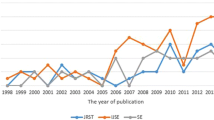Abstract
The importance of argumentation in science education is outlined and the relatively low level of argumentation typically observed in classrooms in the UK is noted, along with possible reasons for this. The research sets out to determine the extent to which primary school pupils engage in argumentation and to characterise their arguments in primary science lessons. A provisional framework is developed for analysing argumentation in this setting. Transcripts of pupils arguing are used to illustrate how pupils co-construct arguments without teacher intervention or guidance. A number of factors which appear to influence argumentation are noted.
Similar content being viewed by others
References
Alexopoulou, E., & Driver, R. (1996). Small-group discussion in physics: Peer interaction modes in pairs and fours. Journal of Research in Science Teaching, 33(10): 1099–1114.
Andrews, R., Costello, P., & Clarke, S. (1993). Improving the quality of argument 5–16: Final Report. Hull, UK: Esmee Fairbairn Charitable Trust/University of Hull.
Billig, M. (1987). Arguing and thinking: A rhetorical approach to social psychology. Cambridge, MA: Cambridge University Press.
Cazden, C. (1988). Classroom discourse: The language of teaching and learning. New York: Greenwood Press.
Costello, P. (2000). Thinking skills and early childhood education. London: David Fulton.
Driver, R., Asoko, H., Leach, J., Mortimer, E., & Scott, P. (1994). Constructing scientific knowledge in the classroom. Educational Researcher, 23(7), 5–12.
Duschl, R., Ellenbogen, E., & Erduran, S. (1999, April). Understanding dialogic argumentation among middle school science students. Paper presented at the annual conference of the American Educational Research Association, Montreal, Canada.
Feasey, R. (1998). Effective questioning in science. In R. Sherrington (Ed.), ASE guide to primary science education (pp. 156–167). Hatfield, UK: ASE/Stanley Thornes.
Fleer, M., & Robbins, J. (2001, July). Hit and run research with hit and miss results in early childhood science education. Paper presented at the annual meeting of the Australasian Science Education Research Association, Sydney, Australia.
Jimenez-Aleixandre, M. P., Rodriguez, A. B., & Duschl, R. (2000). “Doing the lesson” or “doing science”: Argument in high school genetics. Science Education, 84, 757–792.
Keogh, B., & Naylor, S. (1999). Concept cartoons, teaching and learning in science: An evaluation. International Journal of Science Education, 21(4), 431–446.
Kinchin, I. (2000). Concept mapping activities to help students understand photosynthesis – and teachers understand students. School Science Review, 82(299), 11–14.
Kuhn, T. (1970). The structure of scientific revolutions. Chicago: University of Chicago Press.
Kuhn, D. (1992). Thinking as argument. Harvard Educational Review, 62, 155–178.
Kuhn, D., Shaw, V., & Felton, M. (1997). Effects of dyadic interaction on argumentative reasoning. Cognition and Instruction, 15(3), 287–315.
Mercer, N., Wegerif, R., & Dawes, L. (1999). Children's talk and the development of reasoning in the classroom. British Educational Research Journal, 25(1), 95–111.
Millar, L., & Murdoch, J. (2002). A penny for your thoughts. Primary Science Review, 72, 26–29.
Millar, R., & Osborne, J. (1998). Beyond 2000: Science education for the future. London: Kings College, London.
Naylor, S., & Keogh, B. (2000). Concept cartoons in science education. Sandbach, UK: Millgate House Publishers.
Naylor, S., Downing, B., & Keogh, B. (2001, August). An empirical study of argumentation in primary science, using concept cartoons as the stimulus. Paper presented at the European Science Education Research Association Conference, Thessaloniki, Greece.
Newton, P., Driver, R., & Osborne, J. (1999). The place of argumentation in the pedagogy of school science. International Journal of Science Education, 21(5), 553–576.
Nott, M., & Smith, R. (1995). ‘Talking your way out of it’, ‘rigging’ and ‘conjuring’: What science teachers do when practical work goes wrong. International Journal of Science Education, 17(3), 399–410.
Ogborn, J., Kress, G., Martins, I., & McGillicuddy, K. (1996). Explaining Science in the Classroom. Buckingham, UK: Open University Press.
Simon, S., Erduran, S., & Osborne, J. (2002, March). Enhancing the quality of argumentation in school science. Paper presented at the National Association for Research in Science Teaching, New Orleans, USA.
Solomon, J. (1992). The classroom discussion of science-based social issues presented on television: Knowledge, attitudes and values. International Journal of Science Education, 14(4), 431–444.
Solomon, J. (1998). About argument and discussion. School Science Review, 80(291), 57–62.
Swann, J. (1992). Girls, boys and language. Oxford, UK: Blackwell.
Toulmin, S. (1958). The uses of argument. Cambridge, UK: Cambridge University Press.
Wellington, J., & Osborne, J. (2001). Language and literacy in science education. Buckingham, UK: Open University.
Yip, D. Y. (2001). Promoting the development of a conceptual change model of science instruction in prospective secondary biology teachers. International Journal of Science Education, 23(7), 755–770.
Author information
Authors and Affiliations
Corresponding author
Rights and permissions
About this article
Cite this article
Naylor, S., Keogh, B. & Downing, B. Argumentation and Primary Science. Res Sci Educ 37, 17–39 (2007). https://doi.org/10.1007/s11165-005-9002-5
Received:
Accepted:
Published:
Issue Date:
DOI: https://doi.org/10.1007/s11165-005-9002-5




